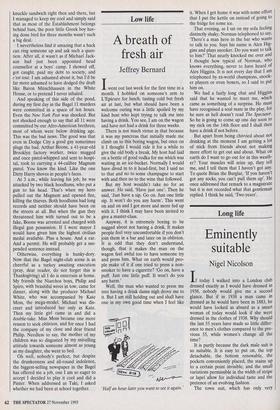Long life
Eminently suitable
Nigel Nicolson
If today I walked into a London club dressed exactly as I would have dressed in 1938, nobody would give me a second glance. But if in 1938 a man came in dressed as he would have been in 1883, he would have looked as absurd as a smart woman of today would look if she were dressed in the clothes of 1938. Why should the last 55 years have made so little differ- ence to men's clothes compared to the pre- vious 55, while women's change all the time?
It is partly because the dark male suit is so suitable. It is easy to put on, the top detachable, the bottom renewable, the pockets conveniently placed, the stains up to a certain point invisible; and the small variations permissible in the width of stripe or lapel allow for individual taste and the pretence of an evolving fashion.
The town suit, which has only very recently become an object of mockery, was smart but modest. It was perfectly adapted to the stooping or swelling figure. Knowing that it created an impression of confidence, it gave the wearer self-confidence. Once, to the astonishment of my family, I was nomi- nated by the Tailor and Cutter the best- dressed man in the House of Commons because the cutter happened to enter the Strangers' Gallery at the moment when I rose to my feet, dressed in my brand-new double-breasted. As only six other Mem- bers were present, there was not much competition, and my reputation did not endure.
Slowly we are becoming a little less con- strained. A short time ago, a man arriving in day clothes at a party to find everyone else in dinner-jackets would probably have gone away. Today he will carry off the sole- cism with a light laugh. But a woman con- fronted by another in an identical dress would almost certainly change if she were in her own house, or try to disguise it with a shawl if she were not. We cling to this inexplicable disparity between the sexes that while men on formal occasions wish to look as indistinguishable as penguins, women insist on looking as different as dis- tinct species of cockatoo.
Once leave the city, and the position is reversed. In my lifetime the variety of men's country clothes has increased enor- mously, while women's have become more uniform. Once the aspiring working class imitated the dress of the upper class. Now the off-duty toff adopts the casual clothes of the fun-loving proletariat, better-cut, perhaps, and better-kept, but increasingly classless and infinitely more attractive. That is for those who care about such things. Most of us do not. We skip the pages devoted to men's fashions as lightly as we leave unread magazines dealing with food or cars. But we accept change without being aware of it, like the slow disappear- ance of hats from our heads or turn-ups from our trouser-legs. In general we are a pretty scruffy lot, and dressing-up, except for an occasion which no longer includes church, is regarded as faintly eccentric or effete.
Not so with women. Those, like Mar- garet Thatcher, who take trouble with their clothes and have a flair for choosing and combining them, benefit from the delight they give men, while men dress less con- sciously to please women. I am nervous that this doctrine may no longer be accept- able. Both sexes dress to please themselves. I remember with shame the morning when the Select Committee on Obscene Publica- tions were hearing the evidence of a dele- gation from the Women's League of Purity, or some such title, and we asked them how they would define obscenity. 'A thing is obscene', their spokeswoman replied, 'if it gives rise to libidinous thoughts.' Good heavens. As she was young and attractively dressed, we all respectfully lowered our eyes.











































































 Previous page
Previous page